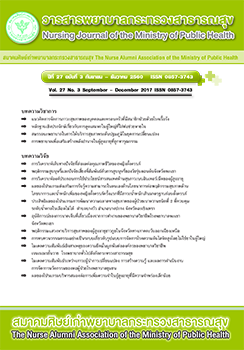โมเดลความสัมพันธ์ระหว่างภาวะผู้นำการเปลี่ยนแปลง การสร้างความรู้และผลการดำเนินงานการจัดการนวัตกรรมของหอผู้ป่วยโรงพยาบาลชุมชน
Main Article Content
Abstract
งานวิจัยครั้งนี้มีวัตถุประสงค์เพื่อศึกษาโมเดลความสัมพันธ์ระหว่างภาวะผู้นำการเปลี่ยนแปลง การสร้างความรู้ และผลการดำเนินงานการจัดการนวัตกรรมของหอผู้ป่วยกลุ่มตัวอย่างเป็นหัวหน้าหอผู้ป่วย โรงพยาบาลชุมชน ที่มีประสบการณ์การบริหารหอผู้ป่วย อย่างน้อย 3 ปี จำนวน 300 คน สุ่มตัวอย่างแบบแบ่งชั้นภูมิ และสุ่มอย่างง่าย เครื่องมือที่ใช้ คือ 1) แบบสอบถามผลการดำเนินงานการจัดการนวัตกรรม ที่ผู้วิจัยสร้างขึ้น ได้รับการตรวจสอบโดยผู้ทรงคุณวุฒิ 9 ทาน มีค่าความตรงตามเนื้อหาเท่ากับ .84 2) แบบสอบถามภาวะผู้นำการเปลี่ยนแปลง และ 3) แบบสอบถามการสร้างความรู้ ตรวจสอบความเชื่อมั่นของแบบสอบถาม พบว่ามีค่าสัมประสิทธิ์แอลฟาของครอนบาคเท่ากับ .91, .94, และ .87 ตามลำดับได้รับแบบสอบถามกลับคืน จำนวน 294 ฉบับ คิดเป็นร้อยละ 98 วิเคราะห์ข้อมูลโดยหาค่าเฉลี่ย ส่วนเบี่ยงเบนมาตรฐาน ค่าสัมประสิทธิ์สหสัมพันธ์ และวิเคราะห์เส้นทางผลการวิจัยพบว่า ภาวะผู้นำการเปลี่ยนแปลงเส้นทางอิทธิพลต่อการสร้างความรู้ (β=0.61) ต่อผลการดำเนินงานการจัดการนวัตกรรม (β=.50) การสร้างความรู้เส้นทางอิทธิพลต่อผลการดำเนินงานการจัดการนวัตกรรม (β=.48) และภาวะผู้นำการเปลี่ยนแปลงร่วมกับการสร้างความรู้เส้นทางอิทธิพลต่อผลการดำเนินงานการจัดการนวัตกรรม (β=.79) แสดงให้เห็นถึงความสำคัญของภาวะผู้นำการเปลี่ยนแปลงของหัวหน้าหอผู้ป่วย ที่แสดงบทบาทของการเป็นผู้คิดค้นนวัตกรรม และเป็นผู้จัดการให้เกิดการสร้างความรู้เพื่อใช้ในการสร้างนวัตกรรมของหอผู้ป่วย ดังนั้นผู้บริหารองค์การพยาบาลควรมีการพัฒนาภาวะผู้นำการเปลี่ยนแปลงให้กับหัวหน้าหอผู้ป่วย และเตรียมความพร้อมให้กับผู้ที่จะขึ้นดำรงตำแหน่งเป็นหัวหน้าหอผู้ป่วย เพื่อให้สามารถจัดการเกิดผลการดำเนินงานการจัดการนวัตกรรมของหอผู้ป่วยที่มีประสิทธิภาพ และประสิทธิผลมากขึ้น
Article Details
บทความและรายงานวิจัยในวารสารพยาบาลกระทรวงสาธารณสุข เป็นความคิดเห็นของ ผู้เขียน มิใช่ของคณะผู้จัดทำ และมิใช่ความรับผิดชอบของสมาคมศิษย์เก่าพยาบาลกระทรวงสาธารณสุข ซึ่งสามารถนำไปอ้างอิงได้
References
2. Chanocha P. Policy statement of the Council of Ministers. Bangkok: Cabinet and royal gazette; 2015. (in Thai).
3. Bureau of Nursing. National nursing service strategy. Nonthaburi: Veterans; 2012. (in Thai).
4. Jirapaet V. Guidelines for the development and design of nursing innovations. In: documentation of national academic conference on nursing innovation for sustainable quality development; May 15- 16; SD Avenue Hotel. Bangkok; 2010. (in Thai).
5. Oecon BWA. Employee innovation behavior in health care: The influence from management and colleagues. Int Nurs Rev 2006; 53: 231-7.
6. Klangtamniam K. Nursing service innovations. Journal of Phrapokklao nursing college 2012; 22 (2): 71-9. (in Thai).
7. Community hospitals district 6. Nursing organization. Report of nursing indicators. (Unpublished); 2015. (in Thai).
8. Panit W. Knowledge management for practitioner. 3rd ed. Bangkok: Tatha; 2006. (in Thai).
9. Luangpirom N. Innovation management. Bangkok: Deaugkamon; 2015. (in Thai).
10. Tidd J, Bessent J. Management innovation. 5th ed. West Sussex: Wiley; 2014.
11. Nonaka I. and Takeuchi H. The Knowledgecreating company: How Japanese companies create the dynamics of innovation. New York:Oxford University; 1995.
12. Mahasinpaisan T. The causal relationship among leadership organizational culture knowledge management and organizational performance of private higher education institutions [dissertation]. Kasetsart University; 2010. (in Thai).
13. Chen YG, Chen ZH, Ho JC, Lee CS. In-depth tourism’s in fluencies on service innovation. J Serv Res 2009; 3(4): 326-36.
14. Bass BM, Avolio BJ. Improve organizational effectiveness through transformational leadership. London: Sage; 1994.
15. Yaghoubi H, Mahallati T, Moghadam AS, Fallah MA. Transformational leadership: enabling factor of knowledge management practices. JSSM 2014; 4(3): 165-74.
16. DeVellis RF. Scale development: Theory and application. 3rd ed. Thousand Oaks (CA): Sage; 2012.
17. Schulze A, Hoegl M. Organizational knowledge creation and the generation of new Product ideas: A behavioral approach. Res Policy 2008; 37:1742–50.
18. Sristhitnarakul B. Development and quality assurance of research instruments: Psychological measurement qualities. Bangkok: Chulalongkorn University; 2012 (in Thai).
19. Hair JF, Black WC, Babin BJ, Anderson RE, Ham RL. Multivariate data analysis. 7th ed. New Jersey: Prentice; 2010.
20. Meehanpong PA. Causal model of patient unit performance in general hospital under Ministry of Public Health. [dissertation]. Christian University; 2014. (in Thai).
21. Vanitjareanchai W. Nursing knowledge management. J of nursing science 2007; 1: 4-13. (in Thai).
22. Song JH, Kolb JA, Lee UH, Kim HK. Role of Transformational leadership in effective organizational knowledge creation practices: Mediating effects of employees’ work engagement. Human Resource Development Quarterly. 2012; 23(1): 65-101.
23. Berraies S, Chaher M, Yahia KB. Knowledge Management enablers Knowledge creation process and innovation performance: An empirical study in Tunisian information and communication technologies sector. Business management and strategy 2014; 5(1): 1-26.
24. Berraies S, Chaher M. Knowledge creation process and firms’ innovation performance: Mediating effect of organizational learning. International J of human resource studies 2014; 4 (1): 204-22.
25. Sirisak P. Impact of transformational leadership organizational creativity and organizational innovation on SMEs performance in Thailand. SJST 2016; 27(3): 11-23. (in Thai).
26. Kungkanjana SA. Causal model of innovation development of the provincial electricity authority. [Dissertation]. Christian University; 2012. (in Thai).

